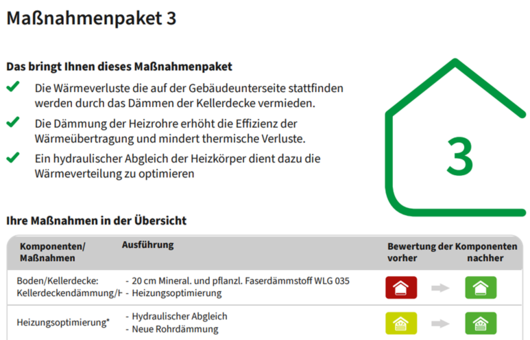Reduce costs and increase the value of the property with energy-efficient refurbishment
Increasingly, condominium owners' associations (WEG) are asking us for support with a possible refurbishment of their property(ies). In Munich alone, goodmen energy is currently commissioned with four WEG projects.
The owners of the flats share the property and infrastructure and are jointly responsible for the roof, lift or heating system. In most cases, they have commissioned a property management company that not only takes care of recurring work, but also organises the planning and implementation of renovation measures.
Since all owners have a say in planned house investments, concluding contracts with a WEG is often more protracted and requires an information-intensive process of collecting and bringing along all parties.
goodmen energy develops an individual, location-oriented and financially suitable concept for each WEG, examines the existing needs, determines savings opportunities and calculates the layout of the system. If desired, we present the resulting measures and solutions at the owners' meeting. We also point out funding opportunities. As a partner for water, in future we will also look at CO2 assessment and suitable reduction measures for the domestic hot water side while complying with all hygienic requirements.
Details:
Mit einem individuellen Sanierungsfahrplan (iSFP) können Bedarfe aufgezeigt und Möglichkeiten zu Energieeinsparungen ermittelt werden. Eine thermische Modellierung der Immobilie macht dies möglich. Es werden Wege aufgezeigt, wie durch eine Sanierung eine Effizienzhaus-Klasse erreicht werden kann. Werden die Maßnahmen realisiert, erhalten Eigentümer hohe Förderungen. Der iSFP selbst ist ebenfalls mit einem Sanierungsbonus von 5% förderfähig.

Owners benefit from this:
- Optimisation of operating costs
- Value enhancement
- Investment in the future that pays for itself quickly
The implementation of an energy supply concept from renewable sources results in lower operating costs and an increase in property value. In addition, these measures are highly eligible for subsidies, so that WEGs and thus each individual owner can save a lot of money with the right advice.
Special form of housing cooperatives:
Similar to the WEG, a housing cooperative is also a form of condominium ownership in which several people jointly hold ownership of one building or several buildings.
- In both cases, the owners are responsible for the renovation work on the house and must agree to the planned measures in a meeting.
- Renovation work must comply with the applicable legal regulations and may only be carried out by qualified planners and craftsmen.
However, there are also some differences:
- A housing cooperative is usually a non-profit organisation run by its members (i.e. the tenants of the flats) and an elected board of directors. A WEG, on the other hand, consists of the owners of the flats.
- Financing: Housing cooperatives usually finance their renovation work through equity (cooperative contributions) and loans. Since they often receive public funding, they often have greater financial resources, which can be an advantage when financing renovation work. In a WEG, on the other hand, renovation costs are borne jointly by all owners and are usually financed through a special apportionment.
- Decision-making: In a housing cooperative, decisions on renovation work are made by the general meeting, which consists of all members of the cooperative. In a WEG, on the other hand, decisions about renovation work are usually made by an owners' meeting in which all owners of the flats can participate.
Housing cooperatives and their members benefit from this:
By taking measures to decarbonise the building stock, cooperatives can increase the value of their buildings and make them more attractive. In addition, more and more banks are only granting building loans if sustainable housing is realised - climate protection and social compatibility must increasingly go hand in hand. This also has a positive impact on ESG ratings. In this way, cooperative shares become more valuable and the common capital increases.



![[Translate to English:] Simulation einer WEG Anlage](/fileadmin/_processed_/f/d/csm_WEG_Projekt_aae02ebf4a.jpg)